|
|
|
Sort Order |
|
|
|
Items / Page
|
|
|
|
|
|
|
| Srl | Item |
| 1 |
ID:
076865
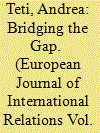

|
|
|
|
|
| Publication |
2007.
|
| Summary/Abstract |
Although International Relations and Middle East Studies share an interest in several aspects of Middle East politics, interdisciplinary research remains surprisingly scarce. This article asks why, despite repeated calls since the inception of these fields, this interdisciplinary gap has never been bridged. It supplements conventional approaches which emphasize a simple intellectual history, with elements of a political economy of the organization and production of knowledge, arguing that while intellectual convergence may be a necessary condition for interdisciplinarity, only a shift in epistemic grounds within which fields understand their scholarship can bring this about, and that this in turn requires a shift in the way knowledge is organized and produced. First, the article provides a genealogy of calls for interdisciplinary scholarship. Second, it locates interdisciplinary relations in the universalist organization of knowledge within which they emerged and which still (re)produce inter- and intra-disciplinary divides today. Finally, it considers the potential for Constructivism to provide an interdisciplinary bridge.
|
|
|
|
|
|
|
|
|
|
|
|
|
|
|
|
| 2 |
ID:
192202
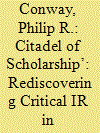

|
|
|
|
|
| Summary/Abstract |
‘Critical’ international relations (IR) is usually understood to have originated in the early 1980s. However, a close reading of Vithal Rajan’s ‘An Epitaph for Detached Scholarship’, published in the inaugural issue of Millennium in 1971, tells another story. Rajan’s article was not a work of critical theory per se, but it was in tune with demands, at this time, for establishing a ‘critical university’. Promising to open up university education to all, dispensing with traditional curricula and authoritarian modes of teaching, the critical university, like Rajan’s article, has long since been forgotten. Nevertheless, this moment set the scene for the professionalised establishment of ‘critical’ academia in the decades to come. Rediscovering Rajan’s ‘Epitaph’ thus offers to reconnect critical IR with an earlier, and perhaps more generative, moment of inception. Indeed, even today, Rajan’s creative, provocative, playful text stands out as a rewardingly undisciplined contribution to the discipline.
|
|
|
|
|
|
|
|
|
|
|
|
|
|
|
|
| 3 |
ID:
157083
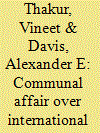

|
|
|
|
|
| Summary/Abstract |
This paper makes an archival journey into the making of institutes of international affairs in late colonial India. By exploring the intertwined lives of two such institutions, it unearths an ideational fight over the study of international affairs in India between the Indian Institute of International Affairs (IIIA), established in 1936, and the Indian Council of World Affairs (ICWA), started in 1943. From the outset, the IIIA was strongly pro-government and saw the ICWA as an institutional rival and a propaganda front for the Indian National Congress (INC). Closer to Independence, the two institutes were increasingly divided along communal and nationalist political lines. The IIIA's leadership became dominated by Muslims and the Muslim League and the ICWA by Brahman Hindus and the INC. As a result, a battle for legitimacy and recognition ensued over participation in international conferences and the ability to publish meaningful research. The ICWA successfully organised the Asian Relations Conference in March 1947, which sealed the fate of the IIIA. It moved to Pakistan in the wake of Partition, then quietly closed down after co-existing briefly with the Pakistan Institute of International Affairs (PIIA).
|
|
|
|
|
|
|
|
|
|
|
|
|
|
|
|
| 4 |
ID:
104036
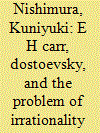

|
|
|
|
|
| Publication |
2011.
|
| Summary/Abstract |
Despite a number of recent studies of Carr's classical theory of international relations, scholars still virtually ignore his early biographical works, especially the one on Dostoevsky. By recovering the connection between Carr's view on international politics and that on Dostoevsky, the present article attempts to advance our understanding about the meaning of Carr's realism-utopianism dichotomy. What Carr tried to do in The Twenty Years' Crisis was to transcend the nihilistic relativism that appeared as a corollary of the rise of the problem of human irrationality. Carr learned from Dostoevsky the epochal meaning of this problem as well as vital insights for generating his own solution to it. Thus arguing, the present article aims at renewing our awareness of the significance of context in the inquiries into early International Relations as well as adding another contribution to the recent revisions of classical realism.
|
|
|
|
|
|
|
|
|
|
|
|
|
|
|
|
| 5 |
ID:
155786
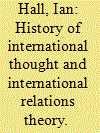

|
|
|
|
|
| Summary/Abstract |
Over the past two decades, historians of international thought have markedly improved our understanding of the disciplinary history of International Relations (IR) and its wider intellectual history. During that period, ‘contextualism’ has become a leading approach in the field, as it has been for half a century in the history of political thought. This article argues that while the application of contextualism in IR has improved our understanding of its disciplinary history, its assumptions about the proper relationship between historians and theorists threaten to marginalise the history of international thought within IR. It argues that unless the inherent weaknesses in contextualism are recognised, the progress made in the field will go unrecognised by a discipline that sees little reason to engage with its history. It suggests that historians of international thought adopt an extensively modified version of contextualism that would allow them to rebuild bridges back into IR, especially IR theory.
|
|
|
|
|
|
|
|
|
|
|
|
|
|
|
|
| 6 |
ID:
155161
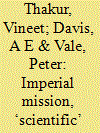

|
|
|
|
|
| Summary/Abstract |
This article offers an alternative account of the origins of academic IR to the conventional Aberystwyth-centred one. Informed by a close reading of the archive, our narrative proposes that the ideas and method of what was to become IR were first developed in South Africa. Here, we suggest how the creation of a racially-ordered state served as a template for the British Commonwealth and later the World State. We draw further on the British dominions’ tour of Lionel Curtis, founder of the Royal Institute of International Affairs (RIIA), between September 1909 and March 1911, to indicate how Edwardian anxieties about the future of empire fuelled the missionary zeal of imperial enthusiasts, who placed enormous trust in the ‘scientific method’ to create a unified empire. This method and the same ideas were to become central features of the new discipline of IR. By highlighting the transnational circulation of these ideas, we also provide an alternative to the nationally-limited revisionist accounts.
|
|
|
|
|
|
|
|
|
|
|
|
|
|
|
|
| 7 |
ID:
185791
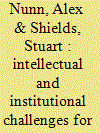

|
|
|
|
|
| Summary/Abstract |
This article asks whether there is a discrepancy between the field of International Political Economy (IPE) as we know it from recent debates about its role, distinctiveness, and contribution compared to the experience of its practitioners on the ground? Intellectually IPE is needed more than ever to engage real world events but faces constraining institutional imperatives. We have two interrelated objectives related to this: (1) to assess the extent to which the patterns in recent interventions are replicated when you ask those who self-identify as IPE scholars in the UK (2) to appraise survey data on the reproduction of a particular community of practice within the field as it evolves intellectually and institutionally. Rather than imposing our interpretation of IPE through publications, citation practices, conference attendance, or textbook content we offer two distinct contributions. First, to report new empirical data on IPE as a ‘field of inquiry’ in UK universities; and, second, to develop a critical intervention on the indisciplined nature of IPE as a field of inquiry in the UK. We conclude that the widely acknowledged and long-standing fertile intellectual advantages of IPE's ‘open range’, unlimited intellectual borders and transgressive enquiry bring institutional disadvantages with them.
|
|
|
|
|
|
|
|
|
|
|
|
|
|
|
|
| 8 |
ID:
183220
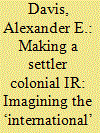

|
|
|
|
|
| Summary/Abstract |
Disciplinary histories of International Relations (IR) in Australia have tended to start with the foundation of an IR chair at the Australian National University (ANU) in 1949. In this article, I trace the discipline's institutional history and traditions of thought from the formation of the Round Table in Australia in 1911, led by Lionel Curtis, through the establishment of the Australian Institute of International Affairs (AIIA), and ending with the ANU story. I argue that Australian IR took as its starting assumption the idea of terra nullius (nobody's land), and the subsequent need to settle Australia. As a result, much of the discussion in the early study of ‘IR’ in Australia was framed around ‘domestic’ matters of settlement and colonisation. The focus of Australian IR radiated outwards from regional capitals, particularly to the tropical and desert regions of Australia with large Indigenous populations. At the margins of this were Australia's colonial possessions in the South Pacific. Finally, Australia's IR looked upon East Asia, motivated at least in part by fears of Asian peoples who might also seek to settle Australia. I conclude with a consideration of what Australian IR's historical entanglements with settler colonialism should mean for the discipline today.
|
|
|
|
|
|
|
|
|
|
|
|
|
|
|
|
| 9 |
ID:
168498
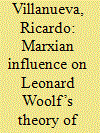

|
|
|
|
|
| Summary/Abstract |
In his own time, Leonard Woolf was one of the most prolific and respected experts on international affairs. Yet, his paramount place in the field fell rapidly, partly because he was a writer whose ideas have been labelled as utopian. This article employs Woolf to challenge the orthodox narrative of the discipline of International Relations (IR) that oversimplifies the early stages of the field as a dichotomy between idealism and realism. While this has already been done cogently by Peter Wilson, this article discloses a Marxist dimension in Woolf’s thought and writings. This is particularly important given that Marxism has regained significance in recent IR debates. Through a contextualist approach, this article demonstrates that Woolf represents a considerable challenge to conventional IR historiography and reveals the significance of Marxian-based understandings in the early stages of the discipline as an alternative to idealism and realism. In addition, this article shows some of the distinctiveness in Woolf’s Marxian writings on imperialism as an alternative to Leninist understandings.
|
|
|
|
|
|
|
|
|
|
|
|
|
|
|
|
| 10 |
ID:
180352
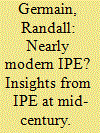

|
|
|
|
|
| Summary/Abstract |
Disciplinary debates within IPE often leave as an open question how contemporary scholars may build on and incorporate insights from its rich intellectual history. In this article I examine the work of three scholars who are rarely grouped together, but who should be recognised today as engaged in an IPE-inflected debate: Karl Polanyi, E. H. Carr, and David Mitrany. They advanced distinct IPE-centred ways of framing the central problems of the post-1945 world, which are remarkable for how they prefigure important themes in modern IPE scholarship. By assembling and considering their work collectively, I make two arguments: (1) we should recognise their contributions as a precursor to modern IPE; and (2) their work, with certain caveats, provides valuable intellectual resources for contemporary scholars. Their combined work should be considered as part of the common heritage of IPE.
|
|
|
|
|
|
|
|
|
|
|
|
|
|
|
|
| 11 |
ID:
179324
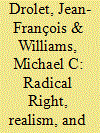

|
|
|
|
|
| Summary/Abstract |
The rise of the radical Right over the last decade has created a situation that demands engagement with the intellectual origins, achievements, and changing worldviews of radical conservative forces. Yet, conservative thought seems to have no distinct place in the theoretical field that has structured debates within the discipline of IR since 1945. This article seeks to explain some of the reasons for this absence. In the first part, we argue that there was in fact a clear strand of radical conservative thought in the early years of the field's development and recover some of these forgotten positions. In the second part, we argue that the near disappearance of those ideas can be traced in part to a process of ‘conceptual innovation’ through which postwar realist thinkers sought to craft a ‘conservative liberalism’ that defined the emerging field's theoretical alternatives in ways that excluded radical right-wing positions. Recovering this history challenges some of IR's most enduring narratives about its development, identity, and commitments – particularly the continuing tendency to find its origins in a defining battle between realism and liberalism. It also draws attention to overlooked resources to reflect upon the challenge of the radical Right in contemporary world politics.
|
|
|
|
|
|
|
|
|
|
|
|
|
|
|
|
| 12 |
ID:
152335
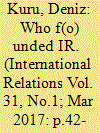

|
|
|
|
|
| Summary/Abstract |
This article aims to present a history of International Relations (IR) that looks at the role of three big American foundations (Carnegie Endowment for International Peace, Rockefeller, and Ford foundations) in the development of IR as an academic field in continental Europe. Its framework goes beyond the usual disciplinary history narratives that focus on IR’s US or UK trajectories, pointing instead to American foundations’ interwar and early post–World War II influence on French and German IR. The cases emphasize US foundations’ interactions with European scholars and international scholarly organizations as major factors shaping IR’s developmental pathways. This study offers a way to consider foundations’ role in IR’s gradual academic institutionalization by connecting disciplinary historical approaches to disciplinary sociology. Its sociologically conscious position underlines the significance of American philanthropies in a historical narrative and recognizes the relevance of transnational dynamics by going beyond usual emphases on ideas and national contexts.
|
|
|
|
|
|
|
|
|
|
|
|
|
|
|
|
| 13 |
ID:
086937
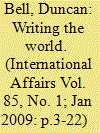

|
|
|
|
|
| Publication |
2009.
|
| Summary/Abstract |
In order to grasp some of the key intellectual developments and trends that shaped the global politics of twentieth century and continue to shape our own world-neo-classical economics, modernization theory, deterrence theory, the democratic peace, among others-it is necessary to explore the history of the human sciences. It is important, in other words, to examine the role of the modern research university in producing and diffusing ideas about the self, society, the economy and world order. International Relations (IR), and political science more generally, played a significant role in this story. In recent years we have seen a growth of interest in the history of IR, though it is still an underdeveloped area of research. Among other things, scholars have shown that many of the foundational myths of the discipline-the views that inform textbook understandings of the past and present-are deeply flawed. This article first surveys this recent work, highlighting its strengths and weaknesses, and then proceeds to offer some thoughts on future directions for research. It identifies a range of questions and topics that have yet to be adequately addressed, and draws on the latest methodological work in intellectual history, highlighting some new interpretative approaches that can enrich scholarship in this area.
|
|
|
|
|
|
|
|
|
|
|
|
|
|
|
|
|
|
|
|
|